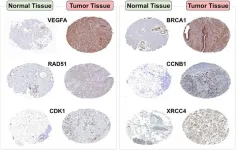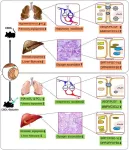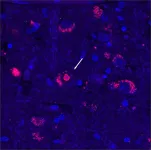New York, NY [April 29, 2024]—Miriam Merad, MD, PhD, a world-renowned immunologist, has been appointed Dean for Translational Research and Therapeutic Innovation of the Icahn School of Medicine at Mount Sinai. The appointment reaffirms Icahn Mount Sinai’s commitment to pioneering medical progress and catalyzing the rapid advancement of research innovation.
Dr. Merad, the Mount Sinai Professor in Cancer Immunology, will also continue to serve as the founding Chair of the Department of Immunology and Immunotherapy, Director of the Marc and Jennifer Lipschultz Precision Immunology Institute, and Director of the Human Immune Monitoring Center.
As Dean, Dr. Merad aims to elevate early clinical trials at Icahn Mount Sinai, streamline the clinical trial process, cultivate a culture of mechanistic clinical trials throughout the campus, and forge stronger partnerships with the pharmaceutical and biotech sectors.
Dr. Merad, an esteemed oncologist and immunologist, has made pioneering contributions to our understanding of the functions of innate immune cells in cancer and inflammatory diseases. Under her leadership, the Precision Immunology Institute fosters collaborations across 42 Icahn Mount Sinai laboratories, integrating expertise in biology, medicine, technology, physics, mathematics, and computational science.
In 2009, Dr. Merad founded the Mount Sinai Human Immune Monitoring Center, one of the nation's first facilities to leverage single-cell technology for the development of disease atlases and the detailed examination of cellular and molecular responses to therapeutic interventions and identification of novel immune targets. Today, the Center is recognized as a leader in identifying novel therapeutic targets, playing a critical role in the fight against cancer and inflammatory diseases.
“Dr. Merad’s vision transformed our understanding of the role of inflammation in diseases and advanced innovative immunotherapy strategies on campus and beyond. She has elevated Mount Sinai as a premier destination for unraveling the mysteries of the human immune system,” says Dennis S. Charney, MD, Anne and Joel Ehrenkranz Dean of Icahn Mount Sinai and President for Academic Affairs of the Mount Sinai Health System.
In a 2010 study published in Science, Dr. Merad discovered a new lineage of macrophages in the brain that she named “tissue-resident macrophages,” which has critical implications for tissue health and repair. This seminal research, cited thousands of times, has reshaped the landscape of immunology textbooks and sparked a global initiative to explore tissue-resident macrophages across various medical disciplines. Dr. Merad and her research team, routinely featured in esteemed journals such as Science, Cell, and Nature, have further elucidated the diverse roles of macrophage lineages in cancer progression, treatment response, and inflammatory bowel disease.
She has also made notable strides in understanding dendritic cells, an important group of cells governing adaptive immunity. Dr. Merad identified a novel subset of dendritic cells, now recognized as a crucial target for bolstering both viral and antitumor immune responses.
In a May 2020 study in Nature, her team unveiled a novel target of macrophages and dendritic cells to enhance antitumor immunity, and in a recent Nature article, her research demonstrated the efficacy of this new therapeutic target in treating patients with lung cancer.
"I am honored to have the opportunity to continue to expand Mount Sinai’s mission of transforming medicine. We are witnessing an unparalleled era in medical history, marked by technological breakthroughs that have revolutionized our comprehension of disease mechanisms, molecular response to treatments, and the creation of innovative therapeutic approaches. In my new role, I will strive to enhance Mount Sinai's proficiency in these critical areas, reinforcing our dedication to advancing health on a global scale," says Dr. Merad, who became a member of Mount Sinai's faculty in 2004.
She obtained her MD from the University of Algiers, followed by a residency and fellowship in hematology/oncology at the University of Paris, and completed her PhD in Immunology jointly at Stanford University and the University of Paris.
Dr. Merad's groundbreaking contributions to immunology and immunotherapy were honored with her elections to the National Academy of Science and National Academy of Medicine. She is also a fellow of the American Association for Cancer Research and a member of the Academy of Immuno-Oncology.
Her parents—accomplished scientific and medical professionals educated in France who practiced in Algeria—imbued her with a profound appreciation for the transformative power of scientific inquiry. Dr. Merad credits much of her success to Mount Sinai, which she describes as providing her the liberty to evolve and pursue her research endeavors. Dr. Merad emphasized the institution's ethos of nurturing young faculty and aspiring scientists, saying, "For those aiming to innovate early, Mount Sinai provides an unparalleled environment to kickstart their careers and drive innovation.”
-####-
About the Icahn School of Medicine at Mount Sinai
The Icahn School of Medicine at Mount Sinai is internationally renowned for its outstanding research, educational, and clinical care programs. It is the sole academic partner for the eight- member hospitals* of the Mount Sinai Health System, one of the largest academic health systems in the United States, providing care to a large and diverse patient population.
Ranked 13th nationwide in National Institutes of Health (NIH) funding and among the 99th percentile in research dollars per investigator according to the Association of American Medical Colleges, Icahn Mount Sinai has a talented, productive, and successful faculty. More than 3,000 full-time scientists, educators, and clinicians work within and across 44 academic departments and 36 multidisciplinary institutes, a structure that facilitates tremendous collaboration and synergy. Our emphasis on translational research and therapeutics is evident in such diverse areas as genomics/big data, virology, neuroscience, cardiology, geriatrics, as well as gastrointestinal and liver diseases.
Icahn Mount Sinai offers highly competitive MD, PhD, and Master’s degree programs, with current enrollment of approximately 1,300 students. It has the largest graduate medical education program in the country, with more than 2,000 clinical residents and fellows training throughout the Health System. In addition, more than 550 postdoctoral research fellows are in training within the Health System.
A culture of innovation and discovery permeates every Icahn Mount Sinai program. Mount Sinai’s technology transfer office, one of the largest in the country, partners with faculty and trainees to pursue optimal commercialization of intellectual property to ensure that Mount Sinai discoveries and innovations translate into healthcare products and services that benefit the public.
Icahn Mount Sinai’s commitment to breakthrough science and clinical care is enhanced by academic affiliations that supplement and complement the School’s programs.
Through the Mount Sinai Innovation Partners (MSIP), the Health System facilitates the real-world application and commercialization of medical breakthroughs made at Mount Sinai. Additionally, MSIP develops research partnerships with industry leaders such as Merck & Co., AstraZeneca, Novo Nordisk, and others.
The Icahn School of Medicine at Mount Sinai is located in New York City on the border between the Upper East Side and East Harlem, and classroom teaching takes place on a campus facing Central Park. Icahn Mount Sinai’s location offers many opportunities to interact with and care for diverse communities. Learning extends well beyond the borders of our physical campus, to the eight hospitals of the Mount Sinai Health System, our academic affiliates, and globally.
-------------------------------------------------------
* Mount Sinai Health System member hospitals: The Mount Sinai Hospital; Mount Sinai Beth Israel; Mount Sinai Brooklyn; Mount Sinai Morningside; Mount Sinai Queens; Mount Sinai South Nassau; Mount Sinai West; and New York Eye and Ear Infirmary of Mount Sinai.
END









